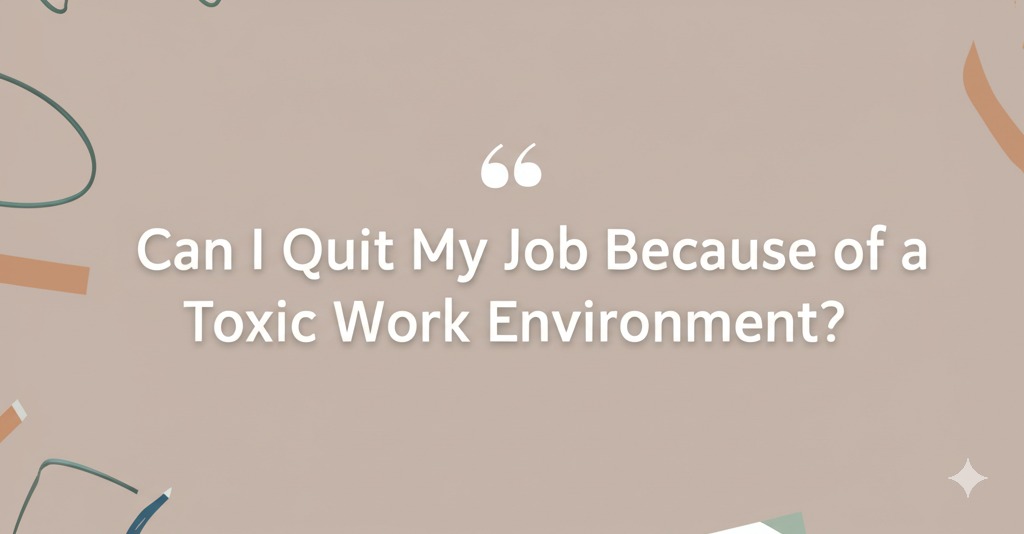
In today’s fast-paced world, many of us find ourselves stuck in jobs that drain our energy, stress our mental health, and leave us feeling unappreciated. One of the most common reasons people consider leaving their job is a toxic work environment. But can you really quit your job for this reason alone? In this article, we’ll explore the signs of a toxic work environment, the potential risks of quitting, and what you can do to make the best decision for your career and well-being.
What Defines a Toxic Work Environment?
A toxic work environment is more than just a bad day at the office. It’s a place where negativity, poor behavior, and unhealthy practices are pervasive, affecting everyone involved. Whether it’s abusive management, excessive workload, or constant office gossip, the impact on mental and physical health can be significant.
Key Characteristics of a Toxic Work Environment:
- Poor Communication: Lack of transparency and constant miscommunication between team members and managers.
- Unhealthy Competition: A culture that pits employees against each other, fostering stress and hostility.
- Lack of Recognition: Hard work goes unnoticed, and accomplishments are undervalued.
- Unreasonable Expectations: Expecting employees to work beyond their capacity, leading to burnout.
- Disrespectful Behavior: Bullying, gossiping, or harassment from colleagues or supervisors.
How Toxic Work Environments Affect Your Health
The effects of a toxic work environment can extend far beyond your job. Long-term exposure to stress, anxiety, and poor working conditions can take a toll on your physical and mental health.
Physical Impact
Chronic stress from a toxic environment can lead to:
- Fatigue: Feeling constantly drained or unable to recharge.
- Sleep Disorders: Difficulty falling or staying asleep due to anxiety or stress.
- Weakened Immune System: Increased susceptibility to illness because of prolonged stress.
Mental Impact
The mental toll of working in a toxic environment includes:
- Anxiety and Depression: Constant worry, feelings of inadequacy, or dread going to work each day.
- Reduced Self-Esteem: The feeling that you are not valued, which can impact your confidence both in and outside of work.
- Burnout: A state of emotional exhaustion caused by prolonged stress without relief.
Should You Quit Your Job Over a Toxic Work Environment?
Deciding whether to quit your job because of a toxic work environment is a big decision. While it might seem like the obvious choice, it’s important to consider the potential consequences and weigh your options.
Pros of Quitting
- Improved Mental Health: Leaving a toxic environment can be a major relief and allow you to focus on self-care.
- Opportunity for Growth: Sometimes, quitting opens the door to new opportunities that are better aligned with your skills and values.
- Regaining Control: Leaving a toxic job can help you regain control over your life and career, setting boundaries that protect your well-being.
Cons of Quitting
- Financial Risk: If you don’t have another job lined up, quitting can create financial uncertainty.
- Career Setbacks: Depending on your industry, quitting without a solid plan could impact your professional reputation.
- Emotional Impact: Leaving a job can be emotionally difficult, especially if you have strong connections to coworkers or feel guilty about leaving.
Alternatives to Quitting
Before you make a final decision, consider the following alternatives to quitting. In some cases, addressing the issues in your current job can improve the situation without the need to leave.
Talk to Your Manager
If you feel comfortable, have an open and honest conversation with your manager about the toxic aspects of the work environment. Effective communication can sometimes lead to meaningful changes and improvements.
Seek Support from HR
If your concerns involve harassment, bullying, or discrimination, HR is the appropriate channel to address these issues. They are obligated to investigate and take appropriate action to resolve conflicts.
Set Boundaries
In some cases, simply setting better boundaries can help reduce the stress of a toxic environment. This could include saying no to excessive work demands, limiting interactions with negative colleagues, or taking breaks to recharge throughout the day.
Look for New Opportunities Within Your Organization
Before quitting outright, explore internal job transfers within your company. A change of department or team may help you escape the toxic atmosphere while still maintaining your position.
How to Make the Decision: Should You Stay or Go?
If you’ve tried addressing the issue and the toxic environment remains unchanged, it might be time to consider leaving. To help with this decision, ask yourself the following questions:
- Can I realistically improve the situation? If the toxic environment seems to be ingrained in the company culture, change may be impossible.
- What is my mental and physical health worth? If staying in the job is taking a serious toll on your well-being, quitting might be the best option.
- Do I have a safety net? Having a financial buffer or another job lined up can ease the transition and make quitting less risky.
- Am I ready for change? Consider how you feel about your career and life outside of the toxic environment. Are you ready to make a positive change?
Conclusion: Taking Control of Your Career
Quitting your job because of a toxic work environment is a personal decision that requires careful thought. While the decision to leave might be difficult, your health and happiness should be a priority. If you find yourself in a toxic situation, consider the options outlined above, and make the choice that aligns best with your long-term goals and well-being. Remember, it’s not just about escaping a toxic environment—it’s about finding a place where you can thrive.

Andre Cuevas provides career insights, job search strategies, and professional advice to help individuals navigate the job market and achieve their career goals.





